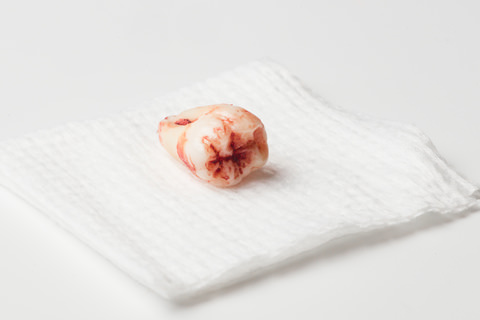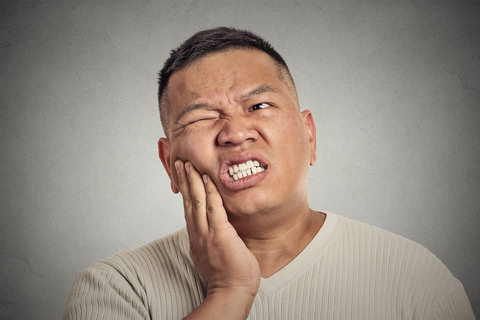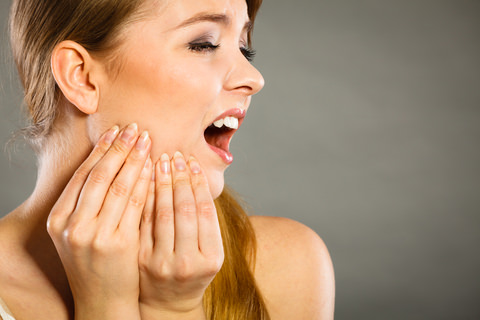Bad Breath After Wisdom Teeth Removal
Bad breath after your wisdom teeth are removed can cause you to worry.
However, this bad odour is perfectly normal and is mostly due to the blood clotting over the extraction site.
This is part of the healing process.
If the smell goes away after you rinse your mouth with salt water, there isn’t much to worry about. The odour usually only remains for 24 or 48 hours.
But if the bad breath persists, you might need to visit your dentist immediately.
It may be an infection or some other harmful deposit on your teeth or in the extraction site.
There are several reasons why your breath might smell bad right after tooth removal.
We’ll discuss them in detail and talk about what you can do to deal with them.
4 Potential Causes For Bad Breath After Wisdom Teeth Removal
There are 4 main causes that can cause bad breath. Some are obvious and some are not.
1. Bleeding & Blood Clots
It is common for the extraction site to bleed right after the wisdom tooth is pulled out. This can result in an unpleasant taste in your mouth, associated with the bad breath in question.
When this blood clots in the mouth, it can give a place for anaerobic bacteria to ferment and release the unpleasant odour.
This can be dealt with by softly rinsing your mouth to wash the clot.
Once the bleeding stops, you can keep slowly sipping water to keep your mouth fresh.
Mouthwash should be avoided, especially for the first 24 hours.
Dentists recommend warm salt water to rinse the mouth only once the 24-hour mark has passed, to help with the pain and swollen gums.
2. Lack of Thorough Cleaning
The lack of thorough brushing and flossing is another prime reason why people get bad breath.
The teeth and gums are sensitive right after a wisdom tooth extraction surgery, and it is vital that the extraction site remains undisturbed during the initial healing stage.
This can lead to food debris buildup in the mouth, bacteria festering, and other problems that cause odour.
It is usually advised that if the patients must, they should use soft-bristled toothbrushes and gargle with lukewarm water.
Saltwater can also be used after the 24-hour mark to help better clean the mouth.
3. Dry Socket
Bad breath or bad taste right after the extraction procedure is normal, but after two or four days it might mean that you have a dry socket.
A dry socket occurs when the blood clot that is supposed to protect and heal the extraction site somehow comes out of the socket, leaving the site unprotected.
The bone and nerve tissues are then exposed, causing intense throbbing pain to the patient and resulting in bad breath.
If you look closely, you can see the exposed bone, rather than a blood clot at the extraction site.
A dry socket is one of the more common complications that occur after wisdom tooth removal and can occur from three to five days after surgery.
Risks of Dry Socket
The risk for dry socket increases significantly if:
- Proper care is not taken, and the dentist’s instructions are not followed.
- The patient smokes.
- The conditions are pre-existent.
- The patient is over 25 years old.
- There were some complications with the extraction process.
Dry socket is a serious condition as it can lead to severe infections and other dental diseases.
Food debris can get lodged into the socket, giving bacteria the perfect place to fester.
You should visit your dentist immediately if you feel that you’ve developed a dry socket.
They can clean any debris out and cover it with a medicated dressing to protect it.
The dressing may be removed or replaced until the socket heals.
4. Medication
Yes, your pain meds can also be the root cause of your mouth letting out a bad odour.
But that does not mean that you stop taking the necessary medication.
Otherwise, you could be subject to a killer toothache.
A dry mouth is a common side effect of pain medications.
Your saliva is your mouth’s natural defence against bacteria that may cause bad breath, and the lack of it may aggravate the problem even further.
Bacteria can quickly set in a dry mouth and thus, cause bad breath.
How do I Get Rid of Bad Breath?
The bad breath caused by the removal of wisdom teeth usually diminishes as the extraction site heals, but in case it doesn’t, you should immediately seek medical attention.
However, in the time your wound is healing after wisdom teeth removal, the initial 48 hours, there are several steps you can take to minimize the bad breath, if not get completely rid of it.
Steps to Prevent Bad Breath
- Use an oral irrigator It can help with the removal of food particles from your tooth socket and all over your tooth. Although not an alternative to brushing, oral irrigators can help you clean your teeth while you heal. You can also adjust the water pressure for sensitive areas of your teeth.
- Rinse your mouth with saltwater, which can act as an antiseptic agent. Lukewarm saltwater can help patients dull down the pain as an added advantage.
- Although the use of mouthwash isn’t recommended at the initial stage if the bad breath continues you can use an antiseptic mouthwash to help reduce the smell while you continue with your treatment.
- Chewing on mint leaves is a natural remedy that has been used for a long time to help with halitosis and keeping the mouth fresh.
- They will also recommend some other remedies explicitly tailored to your needs.
- Drink more and more water. Water can flush out food particles and bacteria that would cause bad breath if left in the mouth.
- Try to chew less from your rear teeth, as it might put undue pressure on your sockets and might result in a dry socket.
- Don’t smoke for at least two days after the surgery. Smoking can disrupt the blood clot, threatening a dry socket. Nicotine from the cigarettes can also get lodged in the sockets and cause an infection, which would further increase your bad breath.
- Alcohol should be avoided as it serves to dry the mouth further. Your pain medications are doing exactly that as it is, so any substance that dries your mouth even further will only cause more inconvenience. Alcohol will also serve as an irritant in your mouth, pricking your inflamed gums and damaged sockets.
- Only include soft foods and liquids in your diet, but avoid sugar as much as possible. Hard foods might get difficult to chew due to the state of your jaw and cause further pain. Particles might also get stuck in your teeth or sockets, which are hard to remove and may cause the smell to linger.
- When brushing your teeth or flossing, even with great care, make sure you don’t overdo it. Excessive rinsing and spitting might end up disrupting the blood clot on your socket and may give rise to a dry socket.
- If you must indulge yourself with sweet and sugary drinks, it is a good idea to drink them with a straw so that your teeth don’t get exposed to bacteria.
- If you find that bad breath doesn’t go away even after implementing these tips, it might be time for you to visit your dentist. They can help you clean your teeth more effectively while ensuring that your socket doesn’t get damaged.
Why Remove Wisdom Teeth at All?
There is a long list of complications that can arise during or after the removal of wisdom teeth.
So the question arises: Why remove wisdom teeth at all?
The answer is simple — to prevent impaction.
Wisdom teeth carry a risk of being impacted, that is, when they don’t have room to grow, they can cause pain, lead to infection, or cause other dental problems.
Some dentists recommend removing the wisdom teeth, even if they aren’t causing any problems, to prevent future problems.
The third molars are given the name “wisdom teeth” and are the last of your teeth to erupt.
Sometimes there isn’t much room for them in your jaw, so they get stuck below the surface of the gums, growing at slightly or drastically tilted angles.
However, that is not always the case.
The tilted wisdom teeth are known as impacted wisdom teeth, erupting either partially or not at all.
An impacted wisdom tooth is likely to cause problems such as:
- Pain.
- Infection.
- Damage to adjacent teeth.
- Development of cysts in the oral cavity around the wisdom tooth.
- Damage to the jaw bone.
- Distort the shape of your jaw and impact your bite negatively.
If any of these problems arise, the wisdom tooth needs to be pulled out.
The extraction process doesn’t result in any long-term complications, but short term only.
These problems include:
- Dry socket.
- Damaged sinuses near the upper wisdom teeth.
- Weakened lower jawbone.
- Decreases sense in the lower lip, tongue or chin due to anesthesia or general damage to the nerves.
These problems get healed with time, though.
How Dentists Remove Wisdom Teeth
To remove wisdom teeth:
- Your oral surgeon starts with administering an anesthetic into the patient’s system either through an intravenous line, inhalation or injections near the site of the extraction, depending on the type of anesthesia used.
- They then make a cut on your gum where the wisdom tooth should be. This creates flaps that are opened to expose the tooth and bone.
- The tooth is then broken down into several sections to make it easier for removal.
- The tooth is then removed.
- After cleaning the site of the tooth and any of its debris, the surgeon stitches the wound back up to promote healing. Stitches aren’t always necessary, though.
- To promote the formation of a blood clot, gauze is placed on top of the extraction site.
Soon after follows an intricate process of healing the extraction site, where the problem of bad breath may arise.
Conclusion
Bad breath when you’ve had your wisdom teeth removed can be a problem.
People are usually concerned more with getting rid of the smell, instead of healing their dental wounds.
If you follow the tips above on dealing with bad breath, it might help you quickly get rid of this problem.
Remember, the longer bacteria can fester in your mouth, the worse your breath will smell!
So, bear with it for a few days, and you can kick that bacteria out soon after.
You should seek your dentist’s advice if the odour becomes unbearable or if you simply want them to clean your teeth for you.
Have you experienced any issues with bad breath when having your Wisdom teeth out?
By Dr. V
Created at November 16, 2018, Updated at January 25, 2025





